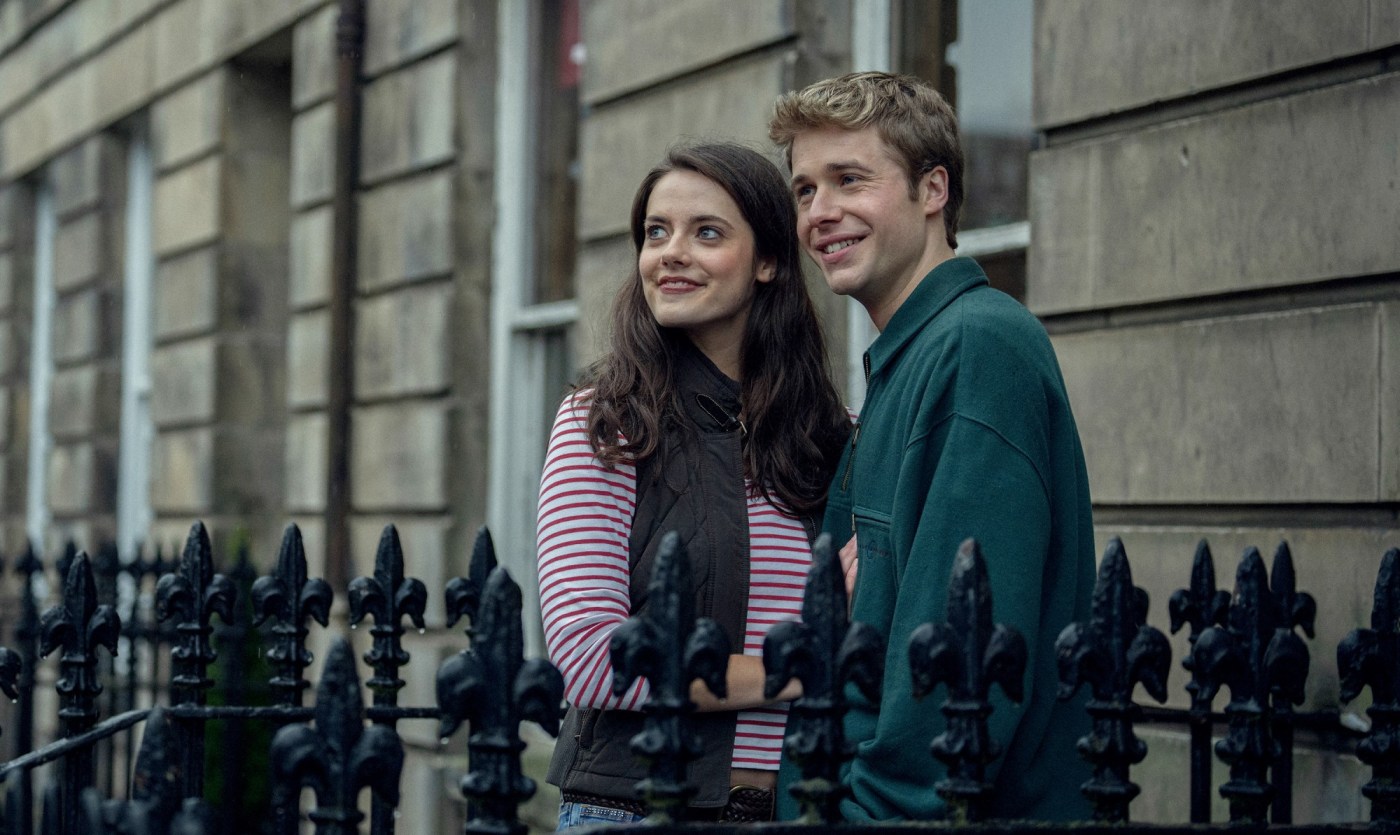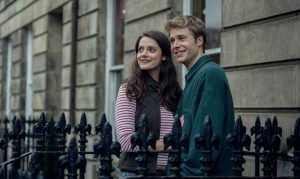
‘The Crown’ Season 6 review: The final episodes shift focus to William and Kate
Despite a hefty budget, luxe visuals and a rotating cast of talented actors conspicuously better looking than their real-life counterparts, “The Crown” ends its six-season run on Netflix revealing surprisingly little beneath the royal family’s inscrutable facade.
With the monarchy forever battling reputational damage off-screen, “The Crown’s” (mostly) deferential approach has been all the more puzzling.
By design, biopics and their TV counterpoints must decide which details to include and which to leave out. Show creator Peter Morgan has made it clear certain things are off-limits. Though Prince Andrew’s friendship with Jeffrey Epstein occurred during the timespan covered in the final season, that detail is absent. Meanwhile, an entire episode focuses on the declining health and death of Princess Margaret. Both events are significant in the life of Queen Elizabeth. Choosing one over the other exposes the limits of Morgan’s curiosity and fortitude.
If the first half of Season 6 benefits from a tight focus on the months leading up to the death of Princess Diana in 1997, the second half is scattered by comparison.
Prince William (Ed McVey) and his grief are central, as are the early days of his relationship with future-wife Kate Middleton (Meg Bellamy). The pair met as classmates at St. Andrews University, but neither is given much in the way of character depth. This makes for an unpersuasive romance. Perhaps that’s the season’s most trenchant observation, intentional or not.
There’s also a narrative arc in which Queen Elizabeth (Imelda Staunton) contemplates — and then rejects — attempts to modernize the Firm, in addition to the aforementioned Margaret portions, followed by the death of the queen’s mother a month later.
Imelda Staunton, left, as Queen Elizabeth II and Jonathan Pryce as Prince Philip in Season 6 of “The Crown.” (Justin Downing/Netflix/TNS)
What impact did those losses have on her? The show has no insights, which seems less a matter of good taste than an inability to capture the experience of grief. That holds true when it comes to William as well. Losing a parent is brutal and destabilizing, and yet “The Crown” fails to develop William as a person beyond his doleful expressions. The show assumes you will fill in those gaps with whatever preconceptions you already have, while William’s interiority remains a mystery.
If the show has a specific point of view about anyone, it’s Charles. His profound inability to center anyone’s feelings but his own is comical in its absurdity. If only William weren’t so mopey it would make his life much easier! And what of his other son? Harry is relegated to a minor side character in “The Crown” and he functions as an obnoxious and corrupting influence on his brother. When William turns to alcohol for liquid courage or to numb his feelings, it’s Harry handing him the drink. That’s a subtle but intentional storytelling choice and I’m not sure what to make of it. But at least it’s a characterization that suggests a personality. The show’s conception of William is a blank.
But then, “The Crown” has lacked real ambition for most of its run. An expensively made Wikipedia page come to life, it often reverts to a “this happened then that happened” approach. Where are the wild speculations and authorial opinion-making? The in-family backbiting gains no traction here. But if these people are willing to throw each other under the bus with the strategic use of press briefings, that seems like a family dynamic worth exploring.
Occasionally the show does land a blow. As heir, William chafes under the pressure to be sensible while Harry gets to be, well, Harry. “Don’t you think I’d like to be the likable rogue?” he snaps. No chance of that, Harry snaps back: “To be a likable rogue, first you have to be likable.” Zing!
Morgan has said he chose not read Harry’s memoir “Spare” before writing the final season because he didn’t want Harry’s voice in his head. Understandable impulse. But Harry is the one royal to have written a fairly detailed insider account of how the family and the monarchy actually operates. Morgan doesn’t have to take that at face value. But it seems like useful context. What sources did Morgan rely on instead — and why wasn’t he equally concerned those would unduly influence his thinking?
That question is especially strange in light of “The Crown’s” portrayal of Camilla. For years it’s been rumored that she manipulates press coverage behind the scenes, either by leaking or planting coverage favorable to her, sometimes at the expense of Charles’ sons. The show deems these speculations irrelevant. Camellia is stalwart and steadfast. The end.
Sometimes this choice doesn’t track with the facts. Diana died in August. By March, Charles decided his boys would accompany him on an official trip to Vancouver, and he’s startled by William’s teenage popularity with the crowds. It’s eerily familiar, Camilla points out. “It’s painful to watch,” Charles replies, “because unlike Diana, Will is a shy old thing.”
Hang on. Diana’s nickname was “Shy Di.” Is Morgan being ironic and tweaking Charles for his cluelessness? Or is the show itself lost in a fog of historical revisionism?
The season’s first half is blunt about Mohamed Al-Fayed’s marriage plotting and I was curious if that would also apply to Kate’s mother, Carole Middleton. As parents, they are mirror images, and Morgan does go there — somewhat. But it’s worth thinking through how the show feels about their parallel efforts.
Mohamed (Salim Daw) is scheming and crass, whereas Carole (Eve Best) only wants the best for her daughter and is gently but firmly pushing her in that direction because “that poor boy needs a nice, normal girl.” It’s fascinating to see the subtle differences in connotation. Mohamed wanted royal proximity for selfish, social-climbing reasons. Carole was acting out of love for her daughter, and, by extension, William.
“The Crown” does nod to larger questions about the monarchy’s relevance — the queen’s refusal to give up her warden of the swans is treated as some kind of moral stand — but does so in ways that dodge the most pressing questions. “The racist royal family” is a line that’s actually spoken, which feels positively radical for Morgan — but those words are undercut by the show’s framing; they are attributed to Mohamed amid his unsubstantiated and increasingly paranoid belief that the palace had Diana and his son murdered. There’s probably a courtier somewhere blanching at that line, regardless.
This month, palace aides have been frantically spin-doctoring the revelations that named two members of the royal family who, during Meghan Markle’s first pregnancy, expressed concerns about the skin color of her children with Harry.
“We’re very much not a racist family,” William awkwardly assured a throng of journalists a couple of years ago. It’s an accusation that remains persistent nevertheless, as the recent news cycle attests. And yet throughout its six-season run, “The Crown” — about an institution that built its wealth on slavery and colonialism — has presented a version of events that suggests otherwise.
I go back to my final thoughts about last season: What does clinging to the monarchy say about a nation’s identity? What if the show took a riskier point of view and wondered who benefits when these porcelain dolls are protected at all costs?
———
‘THE CROWN’ SEASON 6, PART 2
2.5 stars (out of 4)
Rating: TV-MA
How to watch: Netflix
———
©2023 Chicago Tribune. Visit chicagotribune.com. Distributed by Tribune Content Agency, LLC.


